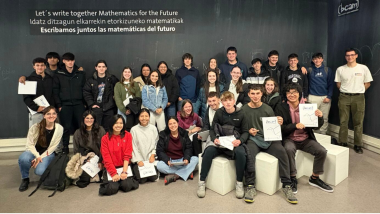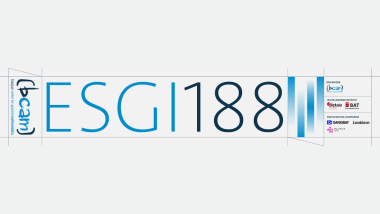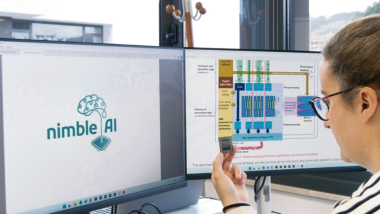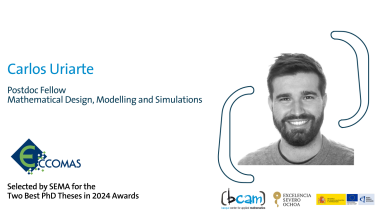Hub launches on 16 March in Madrid
A pioneering initiative in Europe offers cutting-edge mathematical technology 'made in spain' to companies.
- Entities will be able to present their R&D needs in this 'one-stop shop' to research and technology centres, such as AIMEN, the Galician Supercomputing Centre and the Basque Center for Applied Mathematics; and companies such as AIS Group and AnySolution, among others.
- After the problem is posed, a process begins in 15 days to offer a complete diagnosis and a proposal for solutions based on mathematical tools, including machine and deep learning, statistics, simulation, modelling and big data.
- This innovation and knowledge transfer hub for SMEs is part of the PET MSO-ED Platform, with 38 national institutions with expertise in these fields, 18 of them from the private sector, such as Repsol, Petronor, BBVA AI Factory and TSK.
PRESENTATION OF THE MSO-ED HUB OF THE SPANISH PLATFORM FOR MODELLING, SIMULATION AND OPTIMISATION TECHNOLOGIES IN A DIGITAL ENVIRONMENT (PET MSO-ED).
From 10 to 12:15h in Barrabés Growth Space (C. de Méndez Álvaro, 9. Madrid).
In person and in streaming
You must register before 14 March, at 11:00h, here.
Friday 11 March 2022. Innovation is the spearhead of business competitiveness and a key element in improving the well-being of society as a whole. And yet, in our country, less than 20% of small industries and 39% of large ones have a specific R&D department, warns the first Innovation Barometer (2021) prepared by the international consulting firms Leyton and Kantar. The causes include the lack of an innovative ecosystem, the scarcity or high cost of talent, and difficulties in accessing funding. To respond to this urgent need, an innovation desk is being set up, a pioneer in Europe, which places the most cutting-edge mathematical research teams in Spain, from both the academic and private sectors, at the disposal of industry and its needs. It is a collaborative strategy that takes advantage of the experience of research centres and large companies, which already have success stories implemented in their businesses. It will be launched at an in-person event - which can be followed by streaming - in Madrid on Wednesday 16 March (registration is required before 14 March at 11:00).
Process improvement, optimisation, logistics, identification of incidents in physical processes, energy saving... Any entity will be able to present its daily problems in this hub that will act as a one-stop shop, without having to go from institution to institution looking for someone to solve them. At a single point, they will be offered the most appropriate solutions based on cutting-edge mathematical technologies, such as machine and deep learning, statistics, simulation, modelling and big data, among many others.
The initiative is particularly useful for SMEs, as it will allow them to innovate without the need for their own research staff. "Our ambition is that in this way we can contribute to developing an efficient, safe, sustainable, resilient and competitive industrial fabric," explains Peregrina Quintela, president of the Spanish Platform for Modelling, Simulation and Optimisation Technologies in a Digital Environment (PET MSO-ED), promoter of the hub.
The key element that makes the hub a pioneer in Europe is that the assessment of the need posed by the entity and the proposed resolution will not only be carried out by leading academic institutions, but also by R&D teams from companies such as AIS Group, a specialist in the development of artificial intelligence applications, and AnySolution, among many others. "This represents a paradigm shift in innovation with mathematical technologies, as it promotes a more complete and continuous two-way transfer of knowledge between academia and industry," Quintela points out. The researcher considers this aspect so important that, from her position as vice-president of the European Mathematics and Industry Network (EU-MATHS-IN), she is replicating this one-stop-shop model at EU level, although, for the moment, no private groups are involved in offering alternatives to the one-stop-shop model.
Among the aid providers are universities and research centres such as the Politécnica de Cartagena, the Universitat de València, the Basque Center for Applied Mathematics and the Centro de Investigación y Tecnología Matemática de Galicia, among many others. Also, there are technology centres such as AIMEN, the Galician supercomputing centre; and companies such as AIS Group, a pioneer in the introduction of artificial intelligence in Spain, and AnySolution, to name but a few. Coordinating everything from the Platform's technical office will be the Spanish Mathematics-Industry Network (math-in).
Social Challenges
Mathematics is the silent basis of many everyday advances. It is fundamental in covid-19 forecasts: incidence, deaths, expansion of the different strains..... It is also the technology used by leading hospitals to predict one day in advance hospital discharges and surgeries based on patients' history and their biological variables - blood pressure, blood parameters, etc. - conveniently digitised. In these centres, free beds and operating theatres are a precious resource.
In addition, this discipline of science focuses its efforts on making better use of other strategic elements such as energy and water. For example, in a country like Spain, with endemic drought and so many kilometres of coastline, desalination plants can be an interesting production alternative. But one of their problems is that they require a lot of electricity. Improving the efficiency of the installation, determining consumption peaks that can be made to coincide with the moments of greatest energy availability, predicting and preventing maintenance... All of this is the subject of mathematical technologies. As is the fight against fires, the prediction of tsunamis, the identification of soil susceptible to erosion and the early detection of stroke.
Health, energy and the environment. These are three of the "Societal Challenges" identified as strategic in the State Plan for Scientific and Technical Research and Innovation 2017-2020. And although the hub and the Platform are going to give them a certain priority, "we are eager to address different problems that may arise", Quintela points out. For example, machine learning technologies can be used to better understand customer behaviour and increase customer satisfaction with a given company. They can also help to produce high-resolution maps of carbon stocks to help make better decisions about greenhouse gas emissions.
Fast and cost-effective
"Depending on the degree of maturity of the use of these technologies by the entity that approaches us, we either accompany them in the pre-diagnosis phase, trying to identify whether we can help them and in which areas, or, for those that are already users, we move on to the diagnosis phase," Quintela points out. In any case, between one and two weeks after the request at the counter, the requesting entity can have a meeting with specialists in the most appropriate mathematical fields. "We offer a much shorter response time than usual when seeking advice of this kind," says the researcher. Moreover, it is economical: the complete diagnosis and proposal of solutions based on mathematical tools costs 500 euros, a service that is free of charge for members of the platform.
"We not only provide solutions, which in the end is the most important thing, but also look at different formats in which the solution can be implemented; we try to adapt to the peculiarities of each institution that calls the counter," she continues. We try to adapt to the peculiarities of each institution that calls the desk," he continues. "It may only require a one-off action with a specific working group, or it may be more effective to organise a technological meeting to try to get a glimpse of what is being done in a specific field and make more contrasted decisions, a service that is also available at the hub.
Another possible solution could be to open a collaborative project and present it to the European Union to obtain co-financing. In this case, math-in, as the Spanish node of the 19 countries that make up the EU-MATHS-IN, also facilitates the acquisition of international partners. "Our participation in EU-MATHS-IN through math-in makes it particularly easy for us to find partners to form a consortium at European level, because we have direct contact with the heads of the nodes in the other 18 countries," says the researcher.
If there is an agreement between some of the proposals presented by the diagnostic team and the company demanding the service, a contract has to be signed between the entities, the company demanding the service and the institutions providing the service. The hub as such is not a legal entity, its task is to connect interest and supply, demand and service, but once a service is carried out, and a contract is signed, it is signed by the company that demands the service and the entities to which the people who are going to provide the service belong, those of the diagnostic team. What does the hub do there? Quality control and monitoring that the work is being carried out in accordance with the standards.
The Platform
The Spanish Platform for Modelling, Simulation and Optimisation Technologies in a Digital Environment (PET MSO-ED) was launched in April last year with the intention of harnessing "the great potential of mathematics to solve the real challenges of society", explains Quintela. So far, 38 Spanish entities have signed up, 18 academic and the rest non-academic, such as Repsol, Petronor, BBVA AI Factory and TSK, among many others. "They are active members of the Platform and its working groups, and they define the strategies to address the challenges they face, which will thus be very much geared to the real needs of the industry. Because it's one thing for us in academia to imagine what they are, but it's quite another for the companies themselves to be involved in defining them," says the researcher, who was also president of math-in, the Spanish Mathematics-Industry Network, which is in charge of the Platform's technical office.
The research field is represented by leading national centres such as the Basque Center for Applied Mathematics (BCAM), the Centro de Investigación y Tecnología Matemática de Galicia (CITMAga), the Instituto de Ciencias Matemáticas (ICMAT); more than a dozen public universities; and national groups such as the Sociedad Española de Matemática Aplicada (SEMA) and the Sociedad de Estadística e Investigación Operativa (SEIO); among many others. To further boost the interaction between the two poles - industry and academia - the Platform organises events where both can meet. There are also more informative events to raise awareness of the great potential of mathematics in the challenges that humanity needs to solve, to incorporate new public and private entities in the platform, and to make more visible the return to society of the results of research activity financed mainly by public funds. It will also serve as a catalyst for the creation of consortia and projects that are eligible for public and private funding.
The Platform is funded by the State Research Agency, Ministry of Science and Innovation, as part of the call for aid to Technology and Innovation Platforms, of the State Programme for Research, Development and Innovation Oriented to the Challenges of Society, within the framework of the State Plan for Scientific and Technical Research and Innovation 2017-2020. The initiative, with reference PTR2020-001163, is supported by the Mathematics-Industry Thematic Network (RTmath-in, RED2018-102514-T), funded by MCIU-AEI.
More information:
● Hub
● Platform
About the Spanish Mathematics-Industry Network (RTmath-in)
The Spanish Mathematics-Industry Network (math-in) was born, as a private non-profit association, on 30 September 2011 with the signing of its Constitution Act in Santiago de Compostela. The network is currently made up of around forty research groups belonging to around twenty different Spanish universities and research centres; all of them present their technological offerings and capabilities through the one-stop shop in Spain that the network offers them.
Math-in focuses its activity on promoting and carrying out the transfer of mathematical technology to the business and industrial sphere, thus fostering an increase in the competitiveness of both the research groups involved and the industry itself.
It is also the Spanish node of the European Service Network of Mathematics for Industry and Innovation (EU-MATHS-IN) since its foundation in 2013, which has 19 national networks belonging to as many European countries.
CONTACT for more information and interviews:
Elvira del Pozo (DIVULGA).
Tel. 91 742 42 18 / +34 667 39 78 68
elviradelpozo@divulga.es
Related news
About the center
About the center




